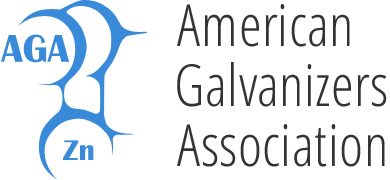What Does "Buy America" Mean to Galvanizers

One of the dominant themes at the January 2014 Transportation Research Board (TRB) Conference and Exhibition was “Buy America.” There are implications for galvanizers but not to the degree most federal procurement people think because they don’t understand the relationship between the fabricator and galvanizer, i.e. the galvanizer rarely has title to the steel galvanized and certainly no control of where the steel is sourced. However, when galvanizers are asked to provide a certificate of compliance for the Buy America provisions of a federal contract, it is important for the galvanizer to understand what they are certifying. The following facts about “Buy America” should provide the required guidance.
- Buy America and Buy American are two distinctly different acts and have very different requirements and processes. Buy America statutory provisions (written in 1982) are in 23 U.S.C. 313 and the regulatory provisions are in 23 CFR 635.410 (written in 1983). Buy America requires a domestic manufacturing process for all steel or iron products permanently incorporated in Federal-aid projects. Buy American requirements (written in 1933) are in 41 U.S.C. 10a – 10d and apply to direct Federal procurement contracts and cover approximately 100 different products.
- Buy America applies to iron and steel products and their coatings and requires all manufacturing processes take place domestically. Manufacturing is any process that modifies the chemical content, physical shape or size, or final finish of a product. Raw materials were originally included; however lack of adequate domestic supply resulted in a 1995 nationwide waiver for iron ore, reduced/processed/pelletized iron ore, pig iron, and raw alloys.
- Buy America requirements apply to the coating materials and the process of applying a coating. The 1991 Intermodal Surface Transportation Efficiency Act expressly provides the application of a coating for iron and steel is subject to Buy America. In 1993, FHWA amended its regulations at 23 CFR 635.410(b)(1) to implement ISTEA section 1041(a) to clarify the manufacturing process for the application of a coating is covered by Buy America requirements. However, the material being applied as a coating is not covered under Buy America.
- Buy America applies only to iron and steel products permanently incorporated into a Federal-aid construction project. Thus, temporary sheet and structural piling and scaffolding are not covered.
- Buy America applies to any steel or iron component of a manufactured product regardless of the overall composition of the manufactured product, e.g. Buy America applies to the steel wire mesh or rebar components of a precast reinforced product such as concrete pipe or bridge abutment.
- Steel fabricated outside the United States and galvanized domestically does not qualify under Buy America.
- Steel fabricated in the United States and galvanized internationally does not qualify under Buy America.
- The Buy America statute and regulations provisions are waived at the time of contract award if a State elects to include an alternate bidding provision in the project advertisement for foreign and domestic steel and iron products, and the lowest overall bid based on using domestic products is 25% more than the lowest overall bid based on using foreign products.
- The Federal Highway Administration (FHWA), Federal Railroad Administration (FRA), and Federal Transit Administration (FTA) all have Buy America requirements.
- Waivers of Buy America are rarely given unless the Secretary of Transportation finds that:
- Enforcement would be inconsistent with the public interest;
- Such materials and products are not produced in the United States in sufficient and reasonably available quantities and of satisfactory quality;
- Inclusion of domestic material will increase the cost of the overall project contract by more than 25%
Summary
To comply with Buy America regulation, zinc as the raw material in the galvanizing (manufacturing) process may be sourced domestically and/or internationally. The galvanizing process itself must be completed in the United States. Compliance also requires steel to be galvanized, fabricated, and produced (manufactured) in the United States and similar to the galvanizing process, virgin and/or recycled materials used in the domestic steel-making process may be sourced outside the United States.

